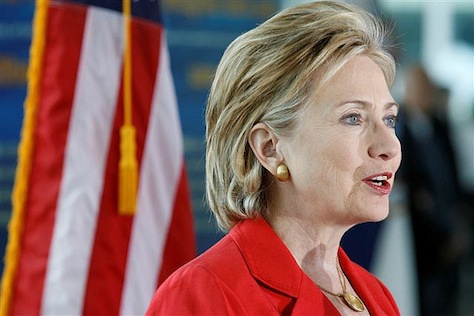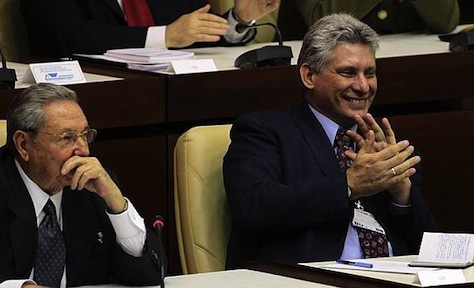The big headline today is that former US secretary of state Hillary Clinton’s upcoming memoirs, which will be released June 10, will state unequivocally that she believes she was ‘wrong’ about her vote authorizing force in Iraq in 2003.![]()
![]()
But the potentially bigger news is that Clinton’s memoirs also state that she unequivocally opposes the US embargo on Cuba — a position that few politicians in the past half-century have dared, lest they draw the wrath of anti-Castro voters in south Florida, a key constituency in a state with 29 electoral votes, more than one-tenth of the electoral votes that Clinton would need to become the 45th president of the United States.
* * * * *
RELATED: A public interest theory of the continued
US embargo on Cuba
* * * * *
Here’s what The Associated Press reports:
In excerpts of the book “Hard Choices” obtained by The Associated Press ahead of its release next week, Clinton writes that the embargo has given communist leaders Fidel and Raul Castro an excuse not to enact democratic reforms. And she says opposition from some in Congress to normalizing relations — “to keep Cuba in a deep freeze” — has hurt both the United States and the Cuban people. She says the 2009 arrest by Cuba of USAID contractor Alan Gross and Havana’s refusal to release him on humanitarian grounds is a “tragedy” for improving ties.
“Since 1960, the United States had maintained an embargo against the island in hopes of squeezing Castro from power, but it only succeeded in giving him a foil to blame for Cuba’s economic woes,” she writes. She says her husband, former President Bill Clinton, tried to improve relations with Cuba in the 1990s, but the Castro government did not respond to the easing in some sanctions. Nonetheless, Obama was determined to continue the effort, she writes. She says that late in her term in office she urged Obama to reconsider the U.S. embargo. “It wasn’t achieving its goals,” she writes, “and it was holding back our broader agenda across Latin America. … I thought we should shift the onus onto the Castros to explain why they remained undemocratic and abusive.”
What Clinton writes is an understatement — regardless of your view on the Castros, it’s impossible to deny that the US embargo has given the Castros the kind of anti-imperial patina that have transformed them from run-of-the-mill socialist authoritarians into champions of Latin American sovereignty.
For the record, I have argued there’s room both to praise the Castros for their role leading the 1961 Cuban revolution and to denounce them for an ensuing half-century of economic negligence and political repression. It’s also understandable why, for two or three generations of Latin Americans who have felt the economic or military sting of US intervention, dating back to the 19th century, the Castros have achieved such an iconic status for their willingness to stand up to the United States.
When Fidel Castro dies, he’ll be mentioned in the same category as Nelson Mandela in many circles globally (if not exactly in the United States), and that has more to do with the United States than with Cuba. Castro may have truly been a menace to US security in 1963, but that’s hardly true today — I’ve argued that the only conceivable public interest theory for the embargo’s existence today is as a warning to any other country within firing range of the United States that the consequences of endangering US security — à la 1963 missile crisis — will be long-lasting and painful. I still think that’s the most coherent justification for the embargo.
But the more convincing explanation, of course, is that both Republicans and Democrats in the United States don’t want to risk the wrath of Cubans in south Florida. Clinton’s written admission — and to some degree, Obama’s relatively open approach to Cuba — is a signal that Castro is no longer as salient an issue for Cuban voters in Florida (or New Jersey or elsewhere, for that matter), many of whom were born after the end of the Cold War, let alone the 1961 revolution. That’s not to say that the Cuban-American electorate is pro-Castro — it’s not, and many of those voters are children and grandchildren of Cubans who fled their home in the face of Castro’s socialism and repression. Obama famously shook hands with Raúl Castro last December.
Though Clinton’s admission on Cuba comes as a belated nod toward reality (and foreign policy realism), it’s worth asking if the Cuba debate has simply moved beyond the Castros.
Fidel Castro, after falling ill in 2006, transferred his presidential duties to his brother Raúl Castro, who was elected president permanently in 2008 and reelected in 2013. Fidel, in retirement at age 87, has obliquely admitted that the socialist economic model hasn’t worked for Cuba. Raúl, at age 83, has opened the Cuban economy to some amount of liberalization and privatization, greater competition for wages and jobs within the still-outsized state sector and encouraged Chinese-style state capitalism and investment.
If Clinton is elected president, she’ll take office in January 2017, with Raúl already headed for the exits — he’s already indicated he won’t stand for reelection in March 2018. His designated successor , for now, is Miguel Díaz-Canel, who became Cuba’s first vice president in March 213. Though he might become the first person in nearly 60 years to rule Cuba whose last name isn’t Castro, there’s good reason to believe that he could even be less open to market or political reforms than Raúl Castro’s regime.
Díaz-Canel replaced José Ramón Machado Ventura, who was born in 1930 — an old-school ideologue who served under Ernesto ‘Che’ Guevara in 1961, and who spent the first decade of Castro rule designing Cuban health care policy.
Díaz-Canel (pictured above, right, with Raúl), at age 54, was born just one year before Fidel Castro came to power. He’s generally regarded as one of the more conservative members of the Cuban high guard, and he’s generally seen as a behind-the-scenes official, not a charismatic leader. He’s been a member of the politburo of the Partido Comunista de Cuba (PCC, Communist Party of Cuba) since 2003, serving as higher education minister between 2009 and 2012, having previously held key partly leadership roles in Villa Clara and Holguin provinces. Though he has little military experience, Díaz-Canel has close ties to the Cuban military elite as well as to other provincial PCC leaders.
Díaz-Canel’s rise is not necessarily a sure thing — the Castros have outlived dozens of would-be successors, designated or otherwise. But there’s an unmistakable sense that the Castros are genuinely preparing for a transfer of power both to another generation and to a more institutionalized system of leadership not unlike the current, leadership-by-management-committee style of the People’s Republic of China.
But no one knows for sure what will happen in Cuba over the next five years.
That means that if and when Clinton takes office, she’ll face a new generation of Cuban leadership about which US officials know relatively little. In other words, by the time of any Clinton administration, the debate may have moved beyond the Castros and even beyond the United States, so long as Cuba has willing partners for investment in China, Brazil, Venezuela (which is arguably a Cuban client state) and other countries. Clinton may find, as president, that Cuba, the most populous country of the Caribbean, with 11.1 million people, will simply ignore the United States instead of antagonizing it. That might be the biggest insult of all, given centuries of ties between the two neighbors. It’s also an incentive for the Obama administration to accelerate normalization of relations sooner rather than later.
After all, an entire cadre of activists, from blogger Yoani Sánchez to Raúl’s own openly lesbian daughter Mariela Castro, have taken the initiative to promote greater freedom from within Cuba, largely without the guidance of the United States, even while the US Agency for International Development somehow spent millions in development aid creating the truly inane ZunZuneo as an alternative to Twitter in Cuba.
Clinton, the wife of former president Bill Clinton, a former two-term senator from New York and secretary of state from 2009 to 2013 under the current president, Barack Obama, is the wide frontrunner to win the Democratic Party’s presidential nomination in 2016, and polls show she would be the most formidable Democratic nominee to win the general election in November 2016.
Thanks to Aaron Benson for recommending the link.


One thought on “Did Hillary Clinton just lose Florida in the November 2016 election?”